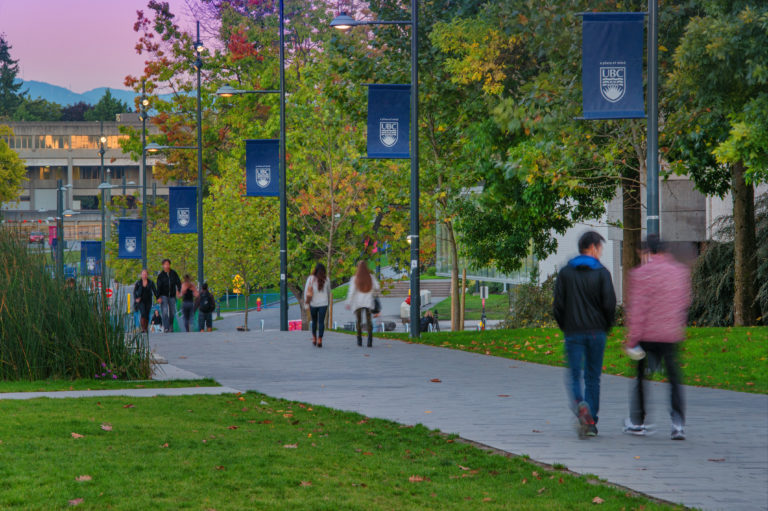
The Board of Governors has approved UBC’s 2019/20 budget, setting spending priorities for the year ahead, to advance the university’s strategic plan: Shaping UBC’s Next Century.
Key investment areas include recruitment and retention of students, faculty and staff; as well as teaching, learning and research infrastructure and support. Under those broad themes, this year’s budget sees investments in areas such as student mental health, student financial aid, research support, and local and global engagement.
The final budget is the result of a consultation process led by Andrew Szeri, Provost and Vice-President, Academic, UBC Vancouver; Peter Smailes, Vice-President, Finance and Operations; and Deborah Buszard, Deputy Vice-Chancellor and Principal, UBC Okanagan.
The process began in October 2018 and included student leaders, both senates, senior staff, academic heads and directors, associate deans, and deans. Each Faculty and Administrative Unit underwent a budget review and, through that process, was asked to submit its priorities for the year ahead. Those requests were then assessed by the Provost and Finance budget teams on each campus, against UBC’s strategic plan, to determine the strongest areas of alignment with the priorities for 2019/20 and beyond.
“We undertook a preliminary ranking of the funding requests and invited stakeholders to provide input on what they saw as the greatest areas of need to move the strategic plan forward,” explains Peter Smailes. “As a result of the widespread consultation, we have increased funding for student financial aid by $11.8-million. Student health and mental health services have also seen an increase of $810,000 above UBC’s ongoing commitment of $7.8-million.”
The next two years will see UBC focusing on six key areas within the strategic plan: Strategy 17, Indigenous Engagement; Strategy 1, Great People; Strategy 3, Thriving Communities; Strategy 7, Research Support; Strategy 11, Education Renewal; and Strategy 14, Interdisciplinary Education.
“If you took a look at the proposals that came in to us, they were all worthy of support,” says Andrew Szeri. “Now that we have the new university strategic plan, we were able to use those priorities to focus our funding decisions in a coordinated way, to support what is collectively most important for the institution.”
For UBC Okanagan, with the continued growth of the campus student body and development of research programs, the focus remains on making investments to position UBCO for the future.
Deborah Buszard explains: “We are making commitments to increase student support, including the Disability Resource Centre, the Equity Office, Sexual Violence Prevention and Response Office and Aboriginal Graduate Fellowships, as well as significant increases to financial aid.
“As part of our system-wide initiatives we are also making investments in Advanced Research Computing, as well as continuing to support research clusters through the Okanagan Excellence fund and a much needed greenhouse. Recognising the increasing demands on our campus services, we are investing in our administrative services to support the rapidly evolving needs of our students, faculty and staff.”
UBC’s $2.2-billion operating budget is funded by provincial grants ($657-million), tuition ($754-million), land proceeds ($33-million), revenue directly earned by Faculties ($181-million), and a combination of business, operational, investment revenue and a contribution from philanthropic gifts ($571-million). These revenues support UBC’s faculty teaching and research, services, ancillary operations, and the Excellence fund.
In addition to reflecting the priorities gleaned through the consultation, the budget must also have the flexibility to respond to existing and emerging issues, both globally and unique to UBC.
One such challenge is the recruitment and retention of students, faculty and staff. This is especially important given the high cost of living in Metro Vancouver, and the challenges of employment within the Okanagan for families of UBC’s faculty and staff.
Countering that challenge requires enhancing infrastructure to attract research talent, continually building on the university’s student, faculty and staff housing initiatives (such as the expansion of the rent geared to income program) and UBC’s commitment to add a further 2,300 student beds at the Vancouver campus, and an additional 440 student beds at the Okanagan campus.
There is also the need to offer salaries that are competitive, within the Public Sector Employers’ Council mandate from the Province of British Columbia. Salaries to attract and retain the high calibre of faculty and staff continue to be the single largest fixed cost, at a total of $1.35-billion. Additional financial pressures include replacement of UBC’s finance, human resource and student administrative systems through the Integrated Renewal Program and deferred maintenance costs for buildings.
Looking ahead, UBC will be paying close attention to the inflation of internal costs and demographic shifts, which show a gradual decline in the numbers of traditional direct-entry domestic students and increasing demands for lifelong learning.
Andrew Szeri continues: “That is a trend that many universities around the world are looking to mitigate. We are exploring how UBC can continue to be the number one choice for top students, both locally and internationally, and how future budgets will need to support that goal.”
Peter Smailes adds: “Budget planning is a big responsibility that we take very seriously. Everyone works diligently to get the balance right of respecting the hard work it takes for students (and their families) to gain admission; with the work of faculty in advancing research and teaching; and the role of staff in innovating service delivery across all areas.”
To learn more, read UBC’s 2019/20 Budget report.